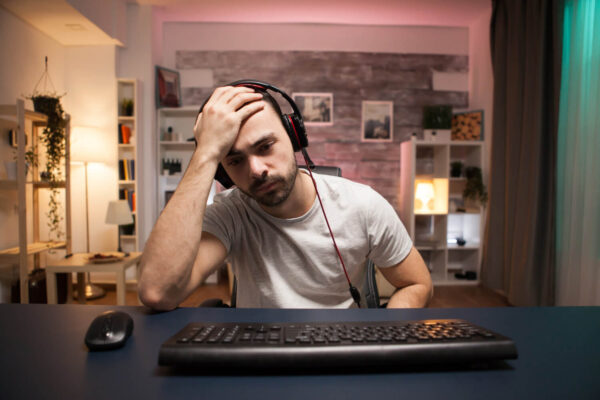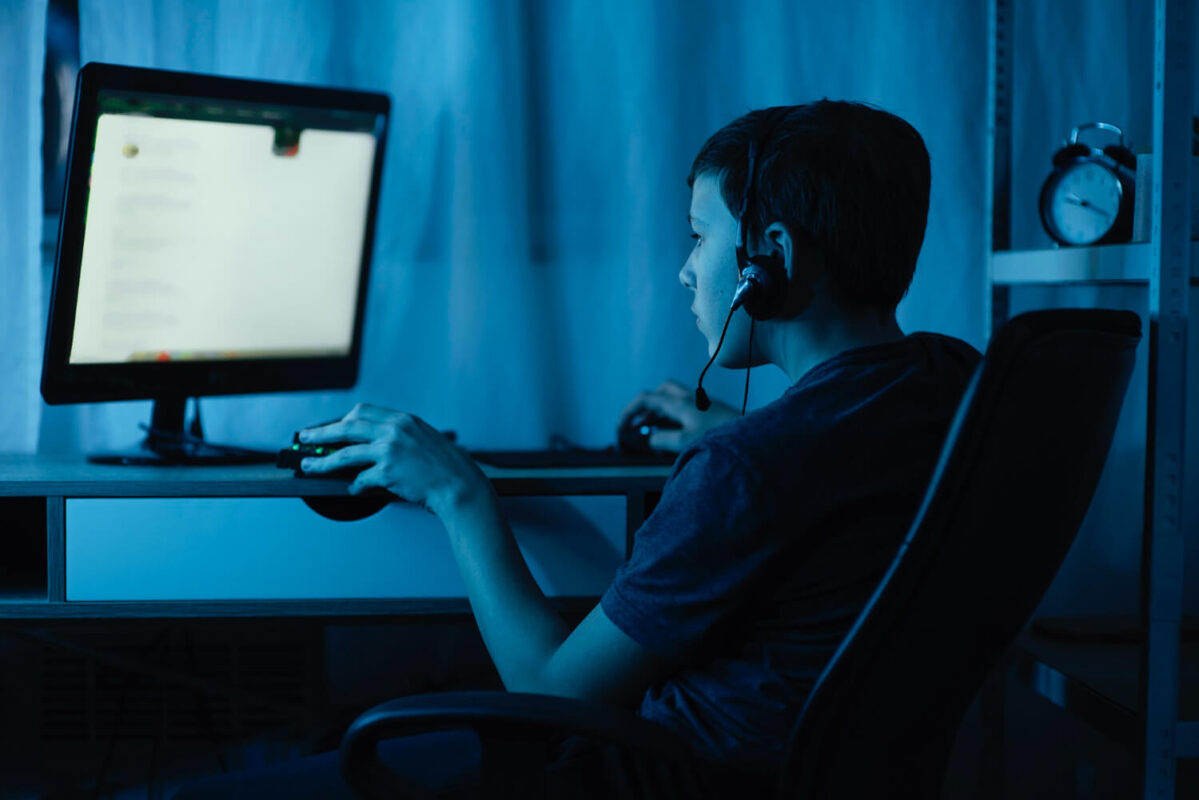Gaming addiction is a serious issue that can take over your life if you don’t take steps to address it. It’s important to recognize the signs of gaming addiction and take action to prevent it from becoming a problem. Gaming addiction is characterized by an inability to control the amount of time spent playing video games, an obsession with gaming, and a lack of interest in other activities. People who suffer from gaming addiction may find themselves neglecting their responsibilities, such as school or work, in order to play video games. They may also experience physical and mental health issues, such as fatigue, depression, and anxiety. If you or someone you know is struggling with gaming addiction, it’s important to seek help. There are a variety of resources available to help people overcome gaming addiction and lead a healthier, more balanced life.
What is Gaming Addiction?
Gaming addiction is a serious issue that can have a major impact on a person’s life. It is characterized by an excessive and compulsive need to play video games, often to the detriment of other aspects of life. People with gaming addiction may find themselves spending hours upon hours playing games, neglecting their responsibilities, relationships, and even their own health. They may become so engrossed in the game that they forget to eat, sleep, or take care of themselves. Gaming addiction can also lead to financial problems, as people may spend large amounts of money on gaming-related items or activities. In extreme cases, gaming addiction can even lead to physical and mental health issues, such as depression, anxiety, and even suicidal thoughts. It is important to recognize the signs of gaming addiction and seek help if necessary.
Signs and Symptoms of Gaming Addiction
Gaming addiction is a serious problem that can take over your life if left unchecked. It is characterized by an inability to control the amount of time spent playing video games, and can lead to a wide range of physical, mental, and emotional issues. Symptoms of gaming addiction include spending excessive amounts of time playing video games, neglecting other activities and responsibilities, and feeling irritable or anxious when not playing. Other signs of gaming addiction include neglecting personal hygiene, sleeping problems, and changes in mood or behavior. If you or someone you know is exhibiting any of these signs, it is important to seek help. Professional treatment can help to identify the underlying causes of the addiction and provide strategies to help manage it. Treatment may include cognitive-behavioral therapy, family therapy, and support groups. With the right help, it is possible to overcome a gaming addiction and reclaim your life.
The Impact of Gaming Addiction on Your Life
Gaming addiction is a serious issue that can have a major impact on your life. It can be difficult to recognize the signs of gaming addiction, as it can be easy to get lost in the game and lose track of time. However, if you find yourself spending more and more time gaming, it is important to take a step back and assess the situation. Gaming addiction can lead to a number of negative consequences, such as neglecting your responsibilities, isolating yourself from friends and family, and even physical health problems. If you are struggling with gaming addiction, it is important to take steps to address the issue. This may include setting limits on the amount of time you spend gaming, seeking professional help, or even taking a break from gaming altogether. It is also important to find healthy ways to fill the time you would have spent gaming, such as engaging in physical activities or spending time with friends and family. Taking these steps can help you regain control of your life and prevent gaming addiction from taking over.
“97% of Male Teens and Young Adults Play Video Games (over 150 million people in the U.S.). 41% of them feel they spend too much time playing video games.”
“Approximately 10% of gamers will develop obsessive and compulsive behavior around their gaming use. This begins to severely negatively affect their lives and ability to function normally. Usually gamers have above average intelligence, but they get stuck in their gaming obsession and fail to thrive.”

How to Overcome Gaming Addiction
Gaming addiction is a serious problem that can take over your life if you don’t take steps to address it. It can be difficult to recognize when gaming has become an addiction, as it can be easy to get lost in the excitement and challenge of the game. However, if you find yourself spending more and more time gaming, and it’s starting to interfere with your daily life, it’s important to take action. The first step to overcoming a gaming addiction is to recognize the problem and take responsibility for it. This can be difficult, as it can be easy to blame external factors for your gaming habits. However, it’s important to take ownership of the issue and make a commitment to change. Once you’ve done this, you can start to take steps to address the addiction. It’s important to set boundaries for yourself when it comes to gaming. This could mean limiting the amount of time you spend gaming each day, or setting a specific time when you will stop playing. It’s also important to find other activities to fill your time, such as exercise, hobbies, or socializing with friends. This will help to reduce the temptation to game and give you something else to focus on. Finally, it’s important to seek help if you need it. There are many resources available to help people with gaming addiction, such as counseling, support groups, and online resources. These can provide valuable support and guidance as you work to overcome your addiction. At Omega Recovery, Dr. Kardaras’s unique program effectively addresses all the underlying issues. While there is a digital detox period, it is during this time that the real work of self-discovery and long-term recovery takes place. We actively engage our gaming clients and connect them with compassionate, well-trained therapists who have been certified by the NIDHW (National Institute for Digital Health and Wellness) and have received extensive training from Dr. Kardaras. Clients embark on the essential psychodynamic work, allowing them to cultivate a stronger and more empowered sense of their own identity, free from the artificial reality of their games.
How Omega Recovery Can Help You
We understand. It began as a hobby, just a bit of computer fun that all your friends were into. What harm could it do? But then you found yourself playing for longer periods, becoming increasingly obsessed with your gaming world. Heck, it might have been the only thing you felt skilled at. And now you’re being told you have to quit? No way! But if you’re in that situation, or if your loved one is trapped in “the Matrix” and struggling in their daily lives, there is a solution. Often, making a change starts with taking the first step of asking for help. Or perhaps reading a website and realizing that there are caring professionals who understand this emerging clinical problem and can assist you or your family member in reclaiming their lives.
Omega Recovery offers a comprehensive and immersive 8-week program, developed by Dr. Nicholas Kardaras, a leading expert in treating tech and gaming addiction. This program not only focuses on addressing gaming addiction but also tackles underlying issues such as depression, anxiety, substance use, self-esteem, low resilience, shame, and trauma. It aims to help gamers find real purpose and meaning in their lives. Dr. Kardaras, author of the best-selling book “Glow Kids”, ensures a holistic approach to recovery.
Dr. Kardaras’s unique program effectively addresses all the underlying issues. While there is a digital detox period, it is during this time that the real work of self-discovery and long-term recovery takes place. We actively engage our gaming clients and connect them with caring, well-trained therapists who have been trained by Dr. Kardaras and certified by the NIDHW (National Institute for Digital Health and Wellness). Clients begin to delve into the underlying psychodynamic work, enabling them to develop a stronger and more empowered sense of their own identity, free from the artificial reality of their games.
- Evidence-based modalities for Gaming Addiction Treatment: Cognitive Behavioral Therapy, Dialectical Behavior Therapy, Peer Recovery Coaching, Nature Immersion, Outdoor Behavioral Health, Narrative Therapy and the “Hero’s Journey”, Mindfulness, Yoga and Somatic Techniques
“So just pulling the plug on the games doesn’t really count as gaming addiction treatment—it doesn’t address what’s driving the compulsive behavior and the need to escape into a gaming fantasy world.”
Tips for Managing Gaming Addiction
Gaming addiction is a serious problem that can take over your life if you don’t take steps to manage it. It can be difficult to recognize when gaming has become an addiction, as it can be easy to get lost in the excitement and challenge of the game. However, if you find yourself spending more and more time gaming, or if you find yourself feeling anxious or irritable when you can’t game, it’s important to take steps to manage your gaming addiction. One of the most important steps to managing gaming addiction is to set limits on how much time you spend gaming. This can be difficult, especially if you’re used to playing for hours at a time, but it’s important to set a limit and stick to it. Additionally, it’s important to take breaks from gaming and engage in other activities, such as spending time with friends or family, exercising, or reading. This will help you to stay focused and motivated, and will also help to reduce the amount of time you spend gaming. Finally, it’s important to talk to someone about your gaming addiction, such as a friend, family member, or therapist. Talking to someone can help you to gain perspective and to develop strategies for managing your gaming addiction.
It is important to be aware of the signs and symptoms of gaming addiction and to take steps to manage it. If you or someone you know is struggling with gaming addiction, it is important to seek help from a mental health professional. With the right support and guidance, it is possible to overcome gaming addiction and lead a healthier, more balanced life. Taking the time to understand the risks of gaming addiction and to develop healthy habits can help you to manage your gaming habits and lead a more fulfilling life. Trust us at Omega Recovery with you or your loved one’s well-being today. We are here and excited to help you get your life back. Give us a call at (512) 601-5407 or visit our website at www.omegarecovery.org.




